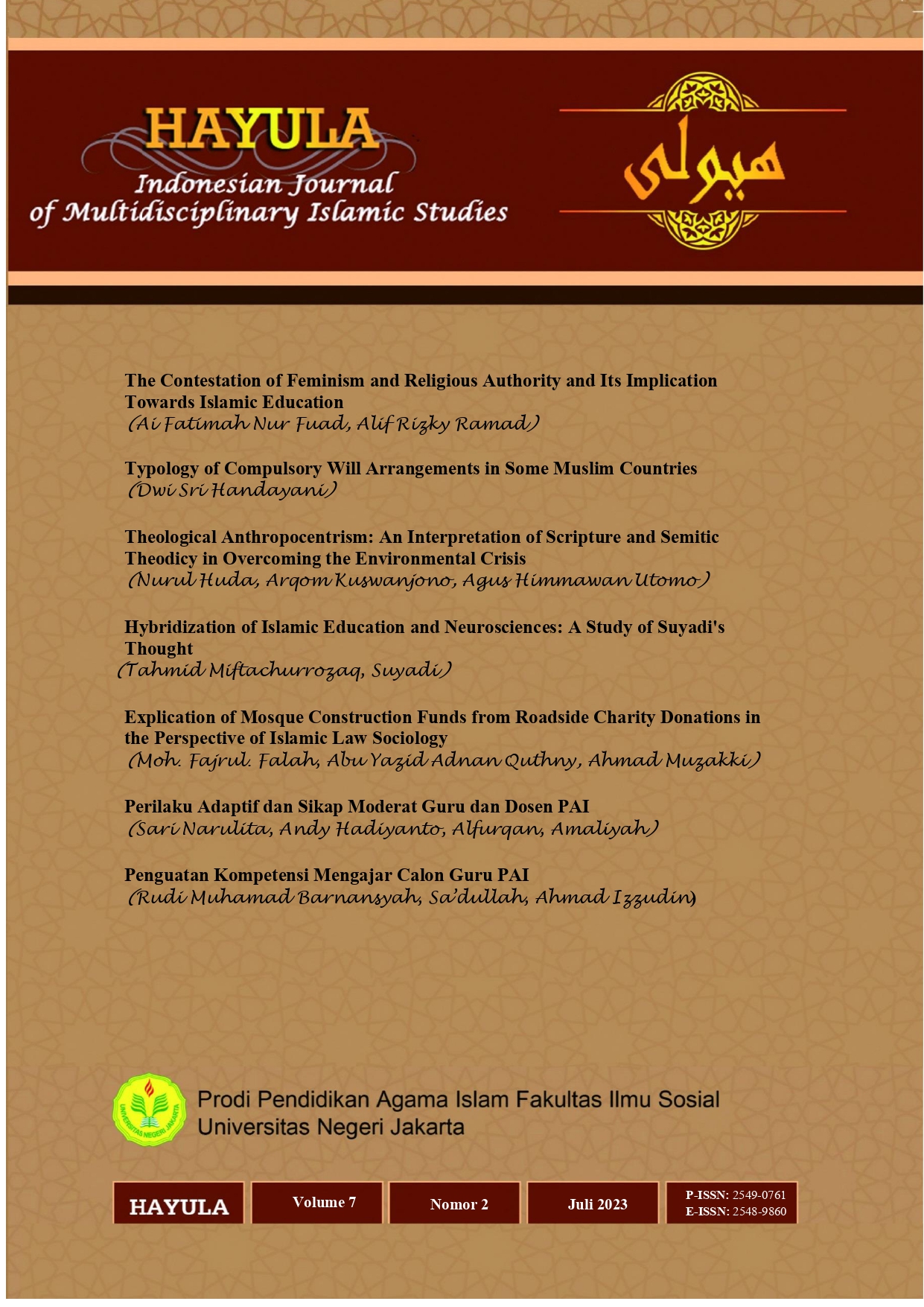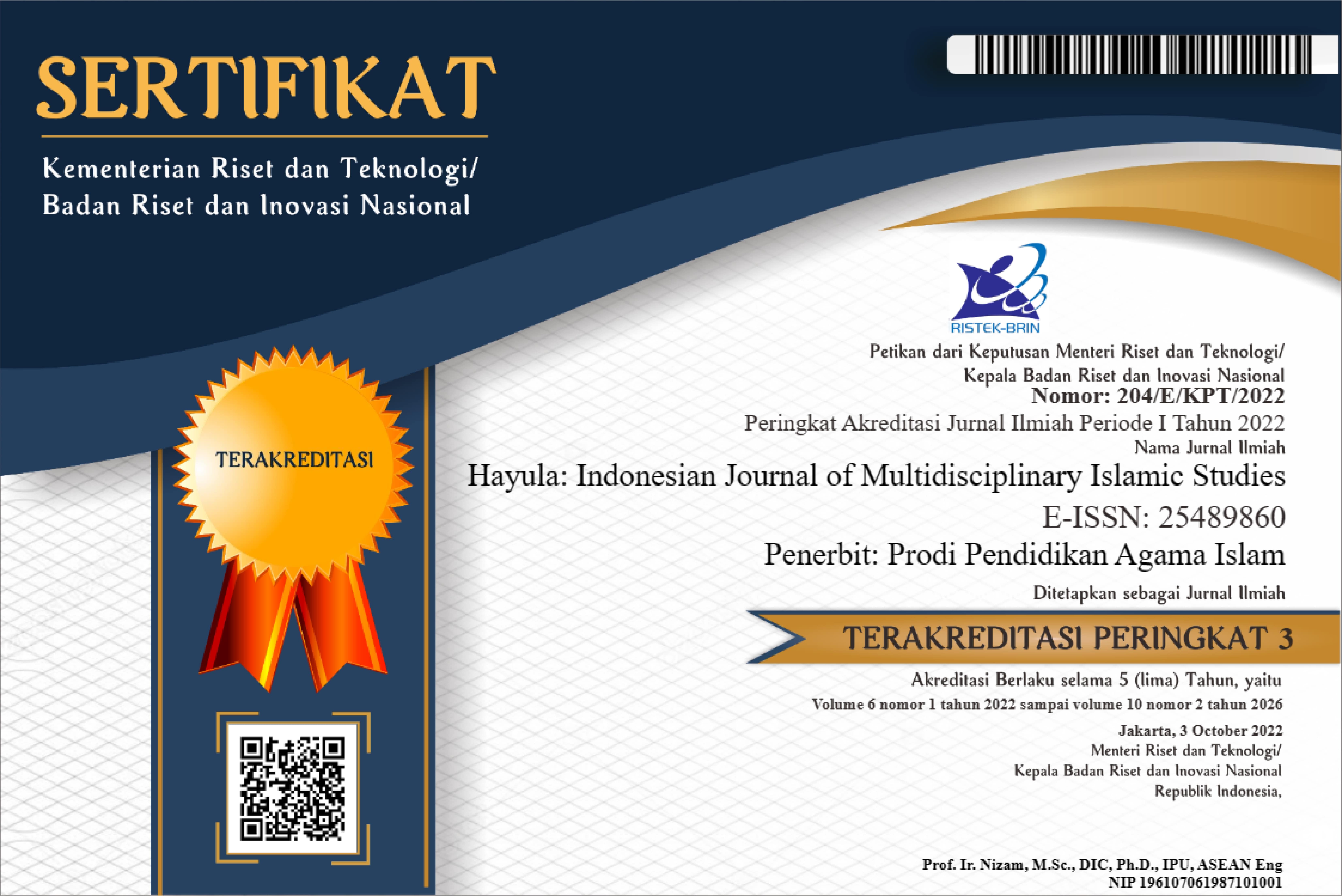Penguatan Kompetensi Mengajar Calon Guru Pendidikan Agama Islam
DOI:
https://doi.org/10.21009/hayula.007.02.07Keywords:
Keterampilan Mengajar, Kompetensi Mengajar, Komponen-komponenAbstract
The study aimed to find out the implementation of the basic skills competencies for teaching PAI teacher candidates. Strengthening the teaching skills of prospective PAI teachers in the digital era does not only focus on mastering the material but demands skills in applying digital-based learning media, in addition to other teaching skills. This research focuses on strengthening the teaching competence of PAI (Micro Teaching) teacher candidates. The research method used descriptive qualitative. The subjects of this study were students in the PAI study program who were taking the Teaching Competency Development (Micro Teaching) course. The results of research on strengthening the teaching competence of Islamic education teacher candidates can be carried out through stimulus and response activities. Stimulus reinforcement can be done with habituation, material enrichment and assignments. The strengthening of the response can be done through the results of student learning in the Teaching Competency Development (Micro Teaching) course. As for the overall results of student mastery of each component of teaching skills, the percentage is above 67%, which is good.
References
Amaliyah, A., Hakam, A., Pratiwi, S. N., & Wulandari, S. (2021). Pengembangan Instrumen Penilaian Keterampilan Sosial Mahasiswa Pada Mata Kuliah Mikro Teaching Pai. Jurnal Tarbiyatuna: Kajian Pendidikan Islam, 5(1), 055-063.
AzharArsyad, Media Pembelajaran, Jakarta: Rajawali Pers, 2013.
Bafadal, Ibrahim, Peningkatan Profesionalisme Guru Sekolah Dasar, Jakarta: PT Bumi Aksara, 2009
Dadang Sukirman. (2019). Keterampilan Dasar Mengajar. Diakses pada tanggal 14 November 2019 http: //file.upi.edu/ direktori /fip/ jur. _kurikulum_ dan _tek ._ pendidikan/195910281987031-dadang_sukirman/makalah_ket_das_mengajar. pdf.
Darmadi, Hamid, Kemampuan Dasar Mengajar, Bandung: Alfabeta, 2009
Hj. Leli Halimah, Keterampilan mengajar (sebagai inspirasi untuk menjadi guru yang excellent di abad ke-21 2017
Ihsanudin. (2020). Presiden Jokowi Teken Keppres Tetapkan Wabah Covid-19 Bencana Nasional. KOMPAS. Com. https//nasional. kompas. com/ read/2020/04/13/18101841/presiden-jokowi-teken-keppres- tetapkan-wabah-covid-19-bencana-nasional
Keterampilan Dasar Mengajar. Yogyakarta: Aswaja Pressindo. Sukirman, D. (2012). Micro Teaching. Jakarta: Direktorat Jenderal Pendidikan Islam Kementerian Agama RI.
Mas Roro Diah Wahyulestari, KETRAMPILAN DASAR MENGAJAR DI SEKOLAHDASAR,https://jurnal.umj.ac.id/index.php/SN%20P/article/viewFile/2770/22 67
Metode, dan Teknik Mengajar. Yogyakarta: Ar-Ruzz Media. Helmiati. (2013).
Micro Teaching melatihUnik Hanifah Salsabila, Peran Teknologi Dalam Pembelajaran Di
Masa Pandemi Covid-19.Al-Mutharahah: Jurnal Penelitian dan Kajian Sosial Keagamaan P ISSN 2088 0871 Vol. 17 No. 2. Juli-Desember 2020
Purwanto Erwan Agus, S. D. R. (2011). Metode Penelitian Kuantitatif dan Kualitattif
Untuk Adminitrasi Publik dan Masalah-Masalah Sosial. Gaya Media.
Sugiyono. (2008). Metode Penelitian Bisnis. Alfabeta.
Sugiyono. (2012). Metode Penelitian Kuantitatif Kualitatif dan R&D. Alfabeta
Usmany, C. E. dan P. (2020). Dampak Pandemi Covid-19 Terhadap Proses Pembelajaran Online. Jurnal Akuntansi, 6(1), 23–38. https://ojs3. unpatti.ac.id/index.php/jak/issue/view/395
Usman, U. (2013). Menjadi Guru Profesional. Bandung: PT Remaja Rosdakary
Downloads
Published
How to Cite
Issue
Section
License
Authors who publish with this Journal agree to the following terms:
- Author retain copyright and grant the journal right of first publication with the work simultaneously licensed under a creative commons attribution licensethat allow others to share the work within an acknowledgement of the work’s authorship and initial publication of this journal.
- Authors are able to enter into separate, additional contractual arrangementfor the non-exclusive distribution of the journal’s published version of the work (e.g. acknowledgement of its initial publication in this journal).
- Authors are permitted and encouraged to post their work online(e.g. in institutional repositories or on their websites) prior to and during the submission process, as it can lead to productive exchanges, as well as earlier and greater citation of published works.
Users/public use of this website will be licensed to CC BY







